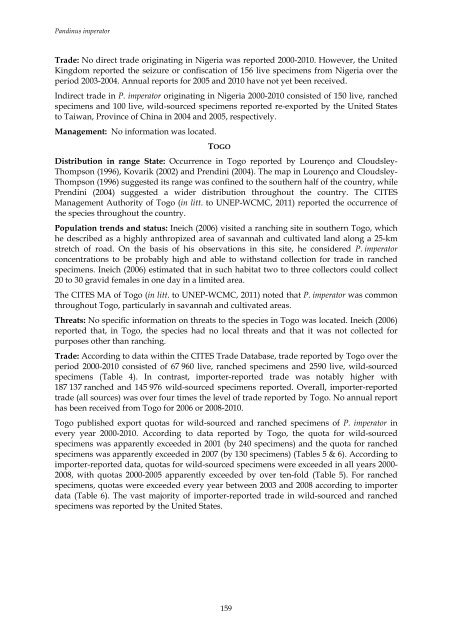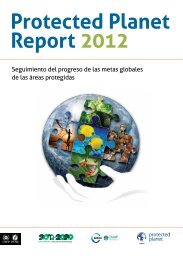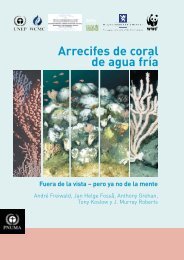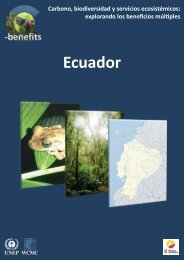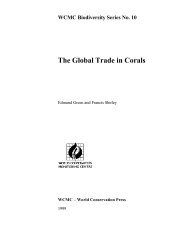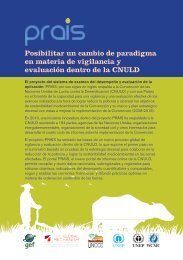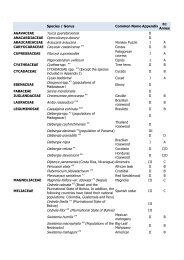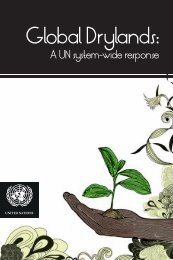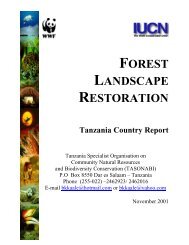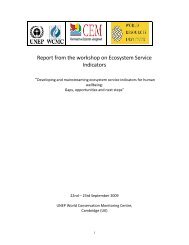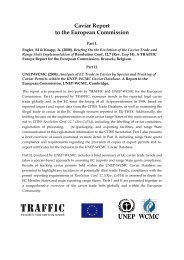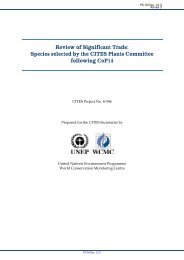2012. Review of Significant Trade - Cites
2012. Review of Significant Trade - Cites
2012. Review of Significant Trade - Cites
Create successful ePaper yourself
Turn your PDF publications into a flip-book with our unique Google optimized e-Paper software.
Pandinus imperator<br />
<strong>Trade</strong>: No direct trade originating in Nigeria was reported 2000-2010. However, the United<br />
Kingdom reported the seizure or confiscation <strong>of</strong> 156 live specimens from Nigeria over the<br />
period 2003-2004. Annual reports for 2005 and 2010 have not yet been received.<br />
Indirect trade in P. imperator originating in Nigeria 2000-2010 consisted <strong>of</strong> 150 live, ranched<br />
specimens and 100 live, wild-sourced specimens reported re-exported by the United States<br />
to Taiwan, Province <strong>of</strong> China in 2004 and 2005, respectively.<br />
Management: No information was located.<br />
TOGO<br />
Distribution in range State: Occurrence in Togo reported by Lourenço and Cloudsley-<br />
Thompson (1996), Kovarik (2002) and Prendini (2004). The map in Lourenço and Cloudsley-<br />
Thompson (1996) suggested its range was confined to the southern half <strong>of</strong> the country, while<br />
Prendini (2004) suggested a wider distribution throughout the country. The CITES<br />
Management Authority <strong>of</strong> Togo (in litt. to UNEP-WCMC, 2011) reported the occurrence <strong>of</strong><br />
the species throughout the country.<br />
Population trends and status: Ineich (2006) visited a ranching site in southern Togo, which<br />
he described as a highly anthropized area <strong>of</strong> savannah and cultivated land along a 25-km<br />
stretch <strong>of</strong> road. On the basis <strong>of</strong> his observations in this site, he considered P. imperator<br />
concentrations to be probably high and able to withstand collection for trade in ranched<br />
specimens. Ineich (2006) estimated that in such habitat two to three collectors could collect<br />
20 to 30 gravid females in one day in a limited area.<br />
The CITES MA <strong>of</strong> Togo (in litt. to UNEP-WCMC, 2011) noted that P. imperator was common<br />
throughout Togo, particularly in savannah and cultivated areas.<br />
Threats: No specific information on threats to the species in Togo was located. Ineich (2006)<br />
reported that, in Togo, the species had no local threats and that it was not collected for<br />
purposes other than ranching.<br />
<strong>Trade</strong>: According to data within the CITES <strong>Trade</strong> Database, trade reported by Togo over the<br />
period 2000-2010 consisted <strong>of</strong> 67 960 live, ranched specimens and 2590 live, wild-sourced<br />
specimens (Table 4). In contrast, importer-reported trade was notably higher with<br />
187 137 ranched and 145 976 wild-sourced specimens reported. Overall, importer-reported<br />
trade (all sources) was over four times the level <strong>of</strong> trade reported by Togo. No annual report<br />
has been received from Togo for 2006 or 2008-2010.<br />
Togo published export quotas for wild-sourced and ranched specimens <strong>of</strong> P. imperator in<br />
every year 2000-2010. According to data reported by Togo, the quota for wild-sourced<br />
specimens was apparently exceeded in 2001 (by 240 specimens) and the quota for ranched<br />
specimens was apparently exceeded in 2007 (by 130 specimens) (Tables 5 & 6). According to<br />
importer-reported data, quotas for wild-sourced specimens were exceeded in all years 2000-<br />
2008, with quotas 2000-2005 apparently exceeded by over ten-fold (Table 5). For ranched<br />
specimens, quotas were exceeded every year between 2003 and 2008 according to importer<br />
data (Table 6). The vast majority <strong>of</strong> importer-reported trade in wild-sourced and ranched<br />
specimens was reported by the United States.<br />
159


